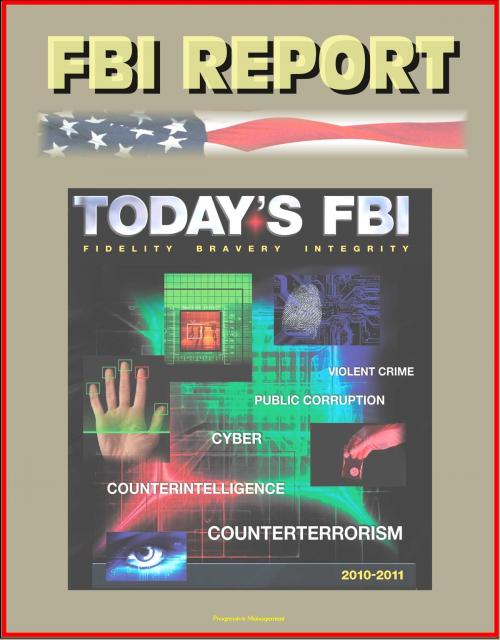FBI Report: Today's FBI Facts & Figures 2010-2011 - Fidelity, Bravery, Integrity - Violent Crime, Public Corruption, Cyber, Counterintelligence, Counterterrorism
Nonfiction, Social & Cultural Studies, Political Science, Politics, Law Enforcement| Author: | Progressive Management | ISBN: | 9781301435517 |
| Publisher: | Progressive Management | Publication: | April 5, 2013 |
| Imprint: | Smashwords Edition | Language: | English |
| Author: | Progressive Management |
| ISBN: | 9781301435517 |
| Publisher: | Progressive Management |
| Publication: | April 5, 2013 |
| Imprint: | Smashwords Edition |
| Language: | English |
Contents: Introduction to the FBI * The Director * Headquarters / Field Offices * International Offices / FBI Budget * A Short History Of The FBI * Working For The FBI * Intelligence * Safeguarding Civil Liberties * Investigative Programs * Counterterrorism * Counterintelligence * Cyber Crime * Public Corruption * Environmental Crime * Civil Rights * Organized Crime * Violent Gangs * White-Collar Crime * Significant Violent Crime * FBI Ten Most Wanted Fugitives * Crimes Against Children * Art Crime * Indian Country * Background Investigations * Law Enforcement Support And Training * FBI Laboratory * Law Enforcement Training Opportunities * Operational Technology Division * Criminal Justice Information Services Division * Information Sharing * Working With The Private Sector * Domestic Security Alliance Council * InfraGard * Business Alliance * Academic Alliance * FBI Citizens' Academy * Ensuring Accountability And Compliance * Annual Inspections * Office of Professional Responsibility * Office of Integrity and Compliance * The Inspector General * The Office of the General Counsel * The Security Division
Throughout its more than 100-year history, the Federal Bureau of Investigation (FBI) has protected the American people from threats to our way of life. As some of our greatest threats—gangsters, public corruption, hate crimes, cyberattacks, white-collar fraud, and terrorism—have evolved, the FBI has changed to meet them head-on. The Bureau's success has always depended on its agility, its willingness to adapt, and the ongoing dedication of its personnel. But in the years since the tragic attacks of September 11, 2001, the pace of change has been unprecedented. The FBI has adapted to globalization and new technologies. We have developed new capabilities to fight international criminal organizations, sophisticated cyber criminals, fraud that undermines the economy, foreign spies seeking to steal vital secrets and technologies, and terrorists working to commit mass murder. It is no longer sufficient to investigate crimes after they occur. The stakes are too high and the dangers too great. The FBI must be more predictive and preventive than at any time in its history. We continue to conduct investigations to bring criminals to justice, but we also use an intelligence-driven approach to prevent crimes and acts of terrorism by disrupting and deterring those who would do us harm. Acting within clearly defined constitutional, legal, and policy boundaries, the FBI conducts investigations to build knowledge and develop insight that will provide early warning, direct operations, create opportunities to further cases, and inform national security policymakers. The FBI's culture emphasizes strong teamwork and collaboration among colleagues, other government agencies, law enforcement partners, and citizens' organizations. By working together to effectively share important information and intelligence and reduce bureaucratic obstacles, we move closer to our goal of security for all Americans.
Contents: Introduction to the FBI * The Director * Headquarters / Field Offices * International Offices / FBI Budget * A Short History Of The FBI * Working For The FBI * Intelligence * Safeguarding Civil Liberties * Investigative Programs * Counterterrorism * Counterintelligence * Cyber Crime * Public Corruption * Environmental Crime * Civil Rights * Organized Crime * Violent Gangs * White-Collar Crime * Significant Violent Crime * FBI Ten Most Wanted Fugitives * Crimes Against Children * Art Crime * Indian Country * Background Investigations * Law Enforcement Support And Training * FBI Laboratory * Law Enforcement Training Opportunities * Operational Technology Division * Criminal Justice Information Services Division * Information Sharing * Working With The Private Sector * Domestic Security Alliance Council * InfraGard * Business Alliance * Academic Alliance * FBI Citizens' Academy * Ensuring Accountability And Compliance * Annual Inspections * Office of Professional Responsibility * Office of Integrity and Compliance * The Inspector General * The Office of the General Counsel * The Security Division
Throughout its more than 100-year history, the Federal Bureau of Investigation (FBI) has protected the American people from threats to our way of life. As some of our greatest threats—gangsters, public corruption, hate crimes, cyberattacks, white-collar fraud, and terrorism—have evolved, the FBI has changed to meet them head-on. The Bureau's success has always depended on its agility, its willingness to adapt, and the ongoing dedication of its personnel. But in the years since the tragic attacks of September 11, 2001, the pace of change has been unprecedented. The FBI has adapted to globalization and new technologies. We have developed new capabilities to fight international criminal organizations, sophisticated cyber criminals, fraud that undermines the economy, foreign spies seeking to steal vital secrets and technologies, and terrorists working to commit mass murder. It is no longer sufficient to investigate crimes after they occur. The stakes are too high and the dangers too great. The FBI must be more predictive and preventive than at any time in its history. We continue to conduct investigations to bring criminals to justice, but we also use an intelligence-driven approach to prevent crimes and acts of terrorism by disrupting and deterring those who would do us harm. Acting within clearly defined constitutional, legal, and policy boundaries, the FBI conducts investigations to build knowledge and develop insight that will provide early warning, direct operations, create opportunities to further cases, and inform national security policymakers. The FBI's culture emphasizes strong teamwork and collaboration among colleagues, other government agencies, law enforcement partners, and citizens' organizations. By working together to effectively share important information and intelligence and reduce bureaucratic obstacles, we move closer to our goal of security for all Americans.















